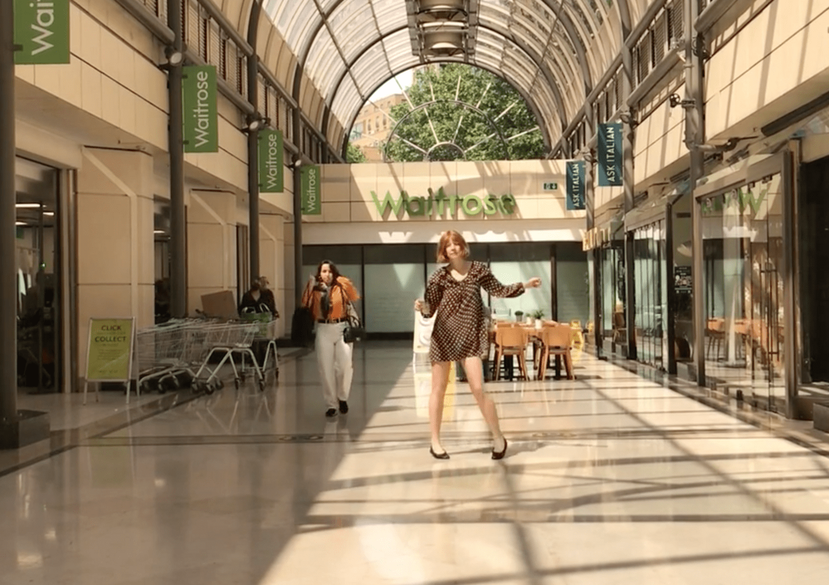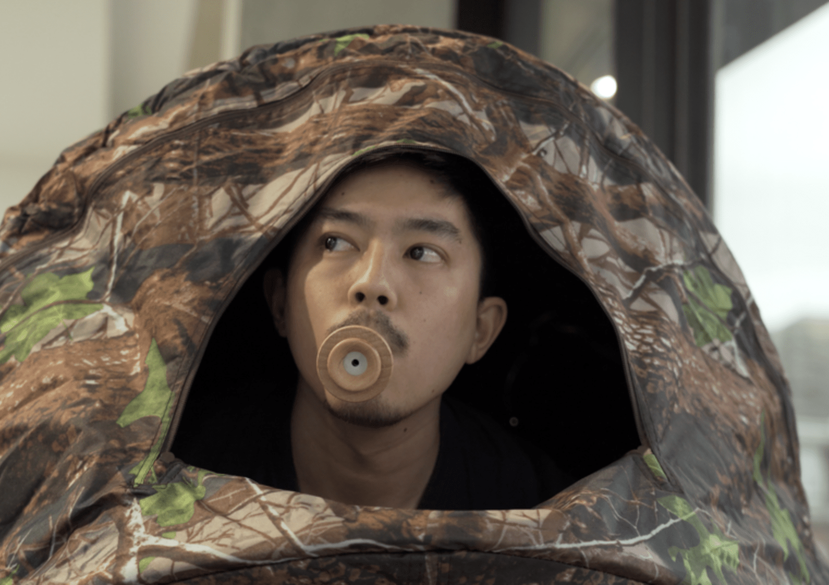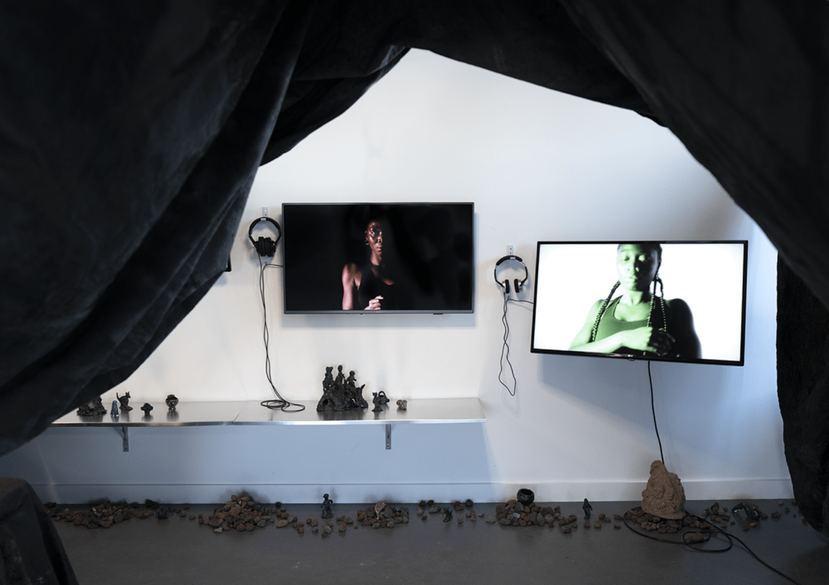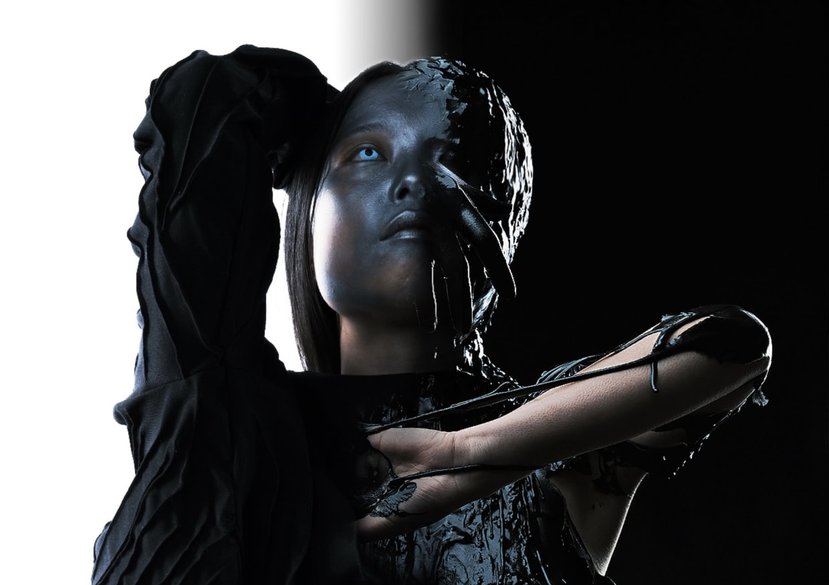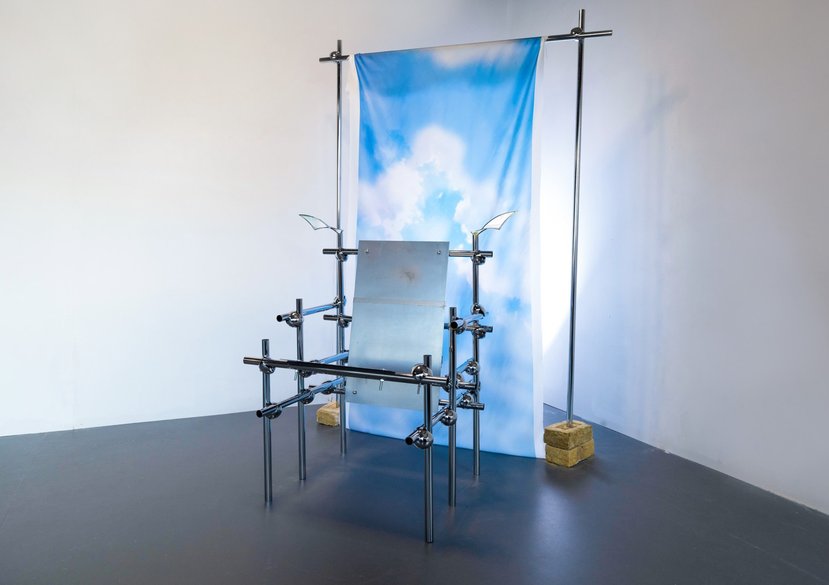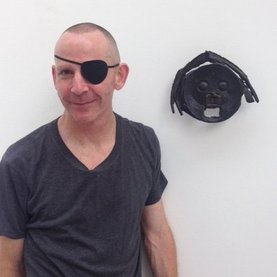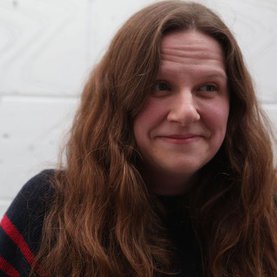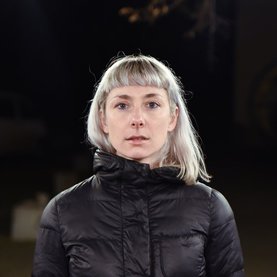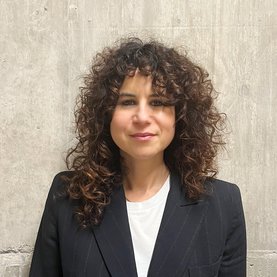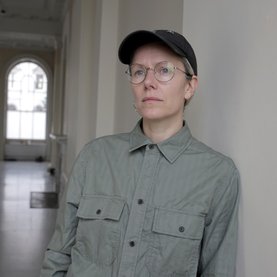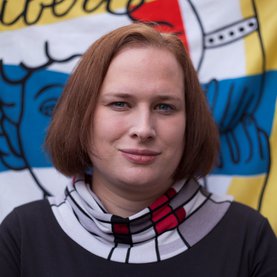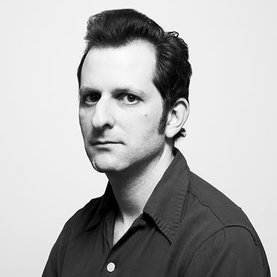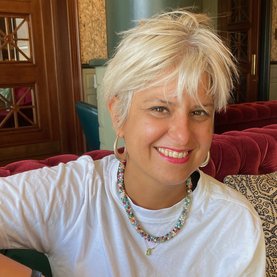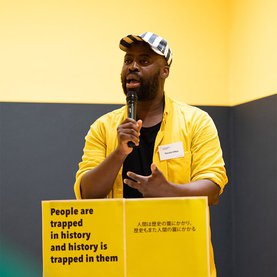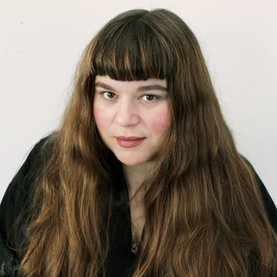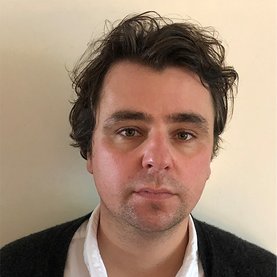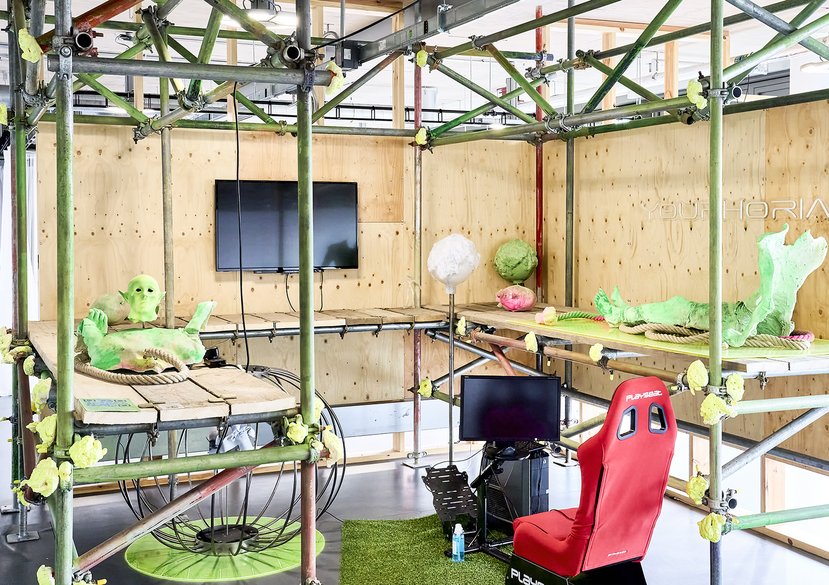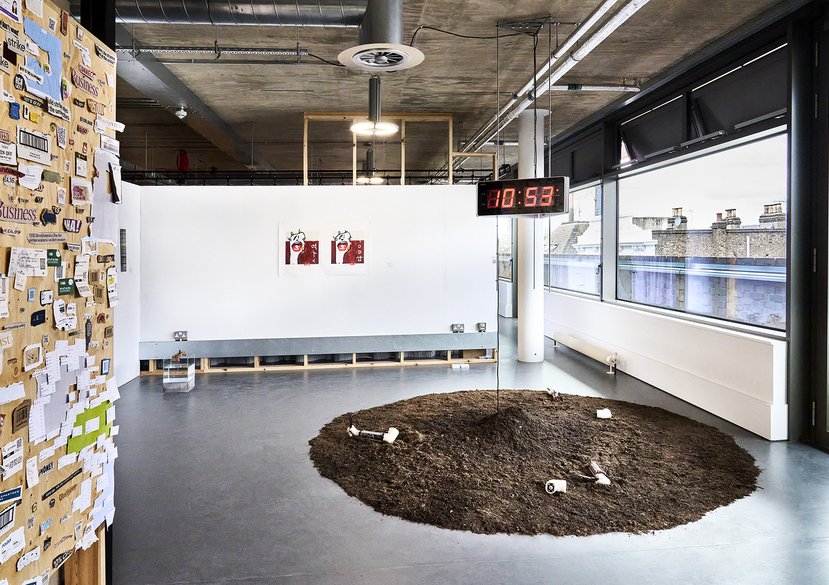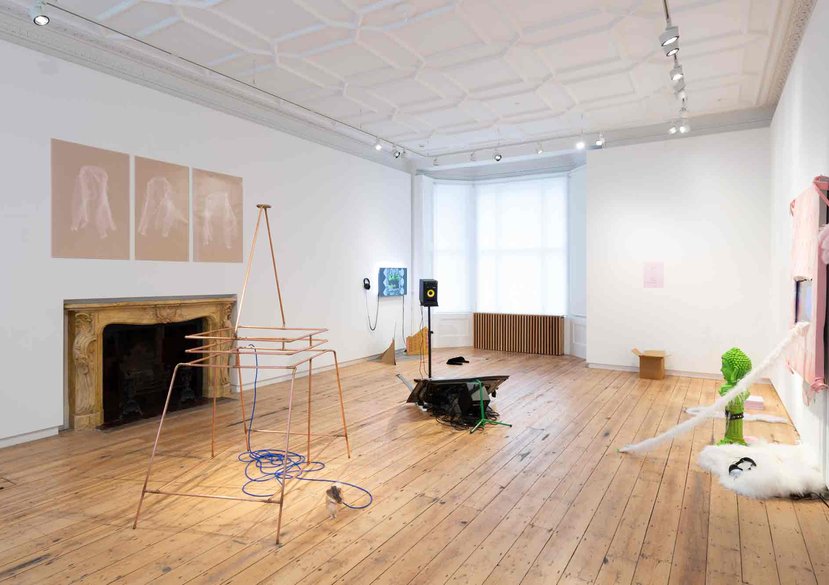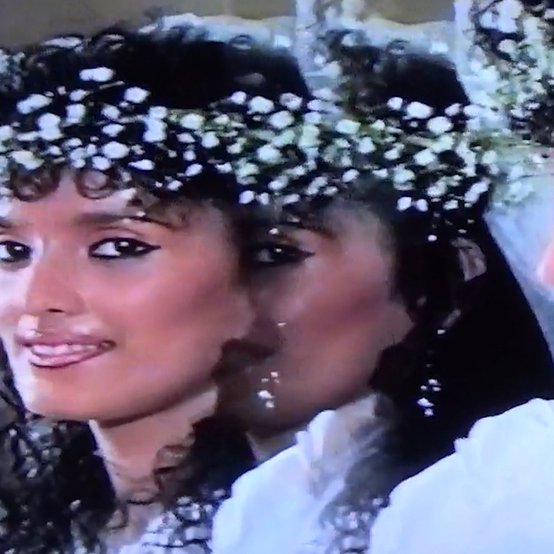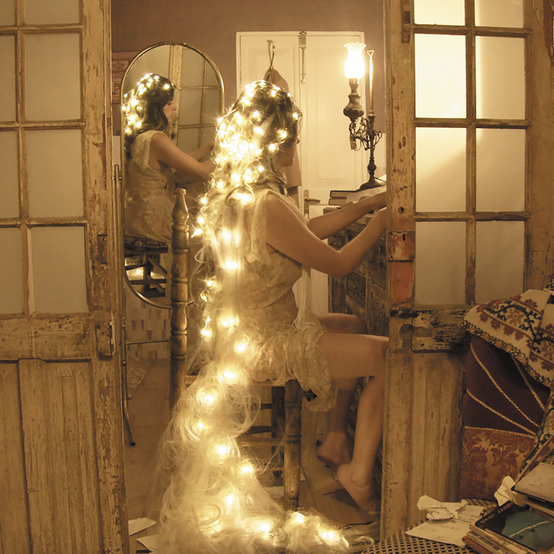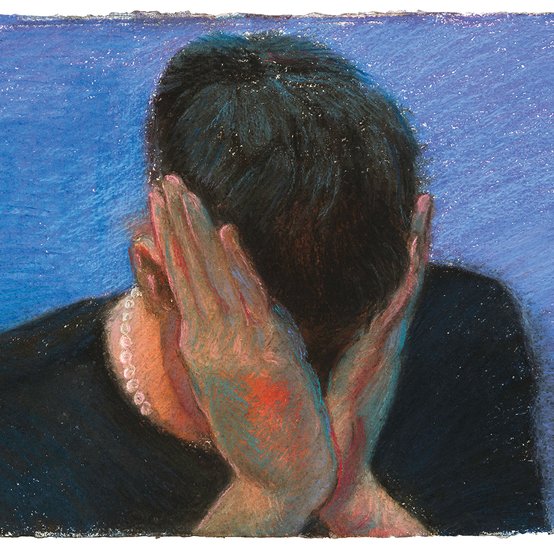
Overview
Reflecting the contemporary world
Key details
- 180 credits
- 1 year programme
- Full-time study
School or Centre
Location
- Battersea
Next open event
Application deadline
- 15 Aug 2024
A discursive environment of experimentation, self-reflexivity and critical art practices
Develop and redefine your art practice at the Royal College of Art. Contemporary Art Practice is a cutting-edge MA programme in the School of Arts & Humanities that blends theory and practice to form new ways of responding to the world. We provide a critical environment emphasising wider political issues and encouraging you to interrogate art production in relation to urgent socio-political contexts.
We support ambitious, research-driven artists specialising in critical, speculative and social art practices, moving image, performance, writing and techno-aesthetics. Our approach isn't limited by technology or materials. CAP students embrace any medium: images, installations, publications, and more.
Join an innovative, dynamic and responsive learning environment and develop new approaches to the thinking, making and exhibition of contemporary art.
Applications for the September 2024 intake are open and will be assessed on a rolling basis. Programmes will close for applications when the maximum number of places have been awarded, or at the final deadline on 14 August, 12 noon (UK time).
Explore graduate work
In July 2023, students presented RCA2023, a series of exhibitions and events. Explore online at the RCA2023 website.
You can also view previous events and exhibitions online at Showcase.
Find out more about this programme
Catch the replays from our latest online Open Day.
Gallery
Staff
Facilities
The School of Arts & Humanities is located across our Battersea and Kensington sites.
View all facilitiesAll full-time students on fine or applied arts programmes are provided with studios or workspace, and access to specialist workshops. There are a number of bookable seminar and project spaces across the site available to all Arts & Humanities students.
Our alumni
Our alumni form an international network of creative individuals who have shaped and continue to shape the world. Click on each name to find out more.
Where will the RCA take you?More details on what you'll study.
Find out what you'll cover in this programme.
What you'll cover
How will I learn?
The programme fosters flexible collective learning. Throughout your studies, you’ll be supported by individual tutorials, group critiques, lectures, seminars and workshops, with critical feedback from world-leading contemporary artists, writers and curators. The curriculum is tailored to nurture the development of your art practice from the earliest manifestations of ideas to platforms for exhibition and making-public while providing the skills required to situate your practice within current material, technological and philosophical debates.
There will be several opportunities to collaborate with others, but at a minimum, your programme will include 239 contact hours and 1561 independent study hours. Contact hours can consist of lectures, seminars, tutorials, critical forums and workshops, among other types of teaching delivery.
Teaching types included in your programme can consist of briefings, projects, tutorials, seminars, lectures, critical forums, technical inductions, technical workshops, offsite visits and blended learning.
Programme structure
The programme is delivered across three terms and includes a combination of programme, School and College units.
Term 1
Situating Contemporary Art Practice (45 credits)
This introductory unit provides the practical and theoretical foundations of the programme. A series of programme lectures, technical and generative workshops and seminars, individual tutorials and group critiques will support you in artwork production and experimentation, helping you to position and situate your practice within contemporary dialogues and debates.
Term 2
Demonstrating Contemporary Art Practice (30 credits)
This unit engages with modes of making-public and with collaborative practices. You will have the opportunity to expand professional networks and engage with sites and contexts of art production and reception. We support your learning through individual and group tutorials, lectures, workshops and reading groups. You will also have the opportunity to collaborate with peers across all aspects of planning and exhibition of a series of public projects and events involving external partners and deliver a presentation of your work in the form of an artist talk.
Urgency of the Arts (15 credits)
School of Arts and Humanities Masters’ students will participate in a School-wide unit called "The Urgency of the Arts." In this unit, we ask how arts and humanities research and practice can engage with our current socio-political climate and how might it shape, be necessary and essential in contemporary cultural debates.
The unit introduces students to diverse perspectives, approaches, and methods relevant to contemporary practice and thought in the arts and humanities. The delivery, predominantly based on workshops and featuring specialist presentations by leading artists, aims to assist students in recognising, questioning, expanding, and reevaluating their own artistic practices and disciplinary assumptions. Through interactions with staff and students from across the School, as well as through a variety of methodological approaches, you will develop an understanding of the contemporary concerns that shape and influence artistic practice. We’ll support you in understanding your work's possibilities, complexities and impact. You will be encouraged to contextualise it within broad cultural landscapes to recognise and emphasise its potential and the complex ways your work may be received and understood.
Term 3
Independent Research Project (60 credits)
This unit is an opportunity to build a body of work that addresses the key ambitions of your research and practice. You will work towards presenting a work or works in the IRP Public Exhibition, which enables you to explore how to activate your work in a public context, experiment with the most appropriate forms of realising your ideas and gain critical feedback. The IRP exhibition takes place mid-way through the unit and will be followed by a period of reflection and further development, which emphasises planning for continued practice and research post-graduation.
You will produce a final artwork for presentation in a public exhibition. You will be supported through individual and group tutorials and one-to-one technical support, alongside a series of programme-specific and School-wide professional practice lectures and workshops, with critical feedback on your work via an external group of arts professionals.
AcrossRCA
AcrossRCA is a compulsory 30-credit unit which is delivered as part of all MA programmes.
Situated at the core of your RCA experience, this ambitious interdisciplinary College-wide unit supports you in responding to the challenges of complex, uncertain and changing physical and digital worlds. Developed in response to student feedback, AcrossRCA creates an exciting opportunity for you to collaborate meaningfully across programmes.
Challenging you to use your imagination and intellect to respond to urgent contemporary themes, this ambitious unit will provide you with the opportunity to:
- make connections across disciplines
- think critically about your creative practice
- develop creative networks within and beyond the College
- generate innovative responses to complex problems
- reflect on how to propose ideas for positive change in local and/or global contexts
AcrossRCA launches with a series of presentations and panel discussions from acclaimed speakers who will introduce the themes and act as inspirational starting points for your collaborative team response.
Delivered online and in-person across two terms, the unit has been designed to complement your disciplinary studies and to provide you with a platform to thrive beyond graduation.
Requirements
What you need to know before you apply
Candidates are selected entirely on merit and applications are welcomed from all over the world. The selection process considers creativity, imagination and innovation as demonstrated in your portfolio, as well as your potential to benefit from the programme and to achieve high MA standards overall.
Candidates are generally expected to have a good BA degree from a fine art course. You should be able to demonstrate an original and critical approach to fine art as well as an ability to engage with current theories of art and culture that inform their practice.
What's needed from you
Portfolio requirements
We invite you to submit a curated selection of your recent practice. The examples can be in any media or form reflecting the multi-disciplinary nature of the Contemporary Art Practice MA programme.
All works may have a consistent form (e.g. a selection of photographic works) or be different. Video or sound work should be edited extracts no longer than five minutes each. Alongside the examples of your work, we would like you to describe how your work is situated within, or engages with, the histories/futures, theories and production of contemporary art.
Let us know what thinkers, writers and artists interest you and speculate upon why this is so. We would like to hear about your opinions and thoughts on global, social and political issues; in what way does your work and practice engage with crucial concerns - either personal and/or global?
Introduce us to your work and speculate on how your artworks address this or respond to it; this could be through the use of different processes, material choices, technologies, sites, interventions with groups or publics, critical writing, performance and the performative.
We are committed to decolonising the institutions of art and education; our current students work with a range of ideas regarding class, race, gender (feminism and trans) and disability.
Video requirements
You must submit a video of no more than two minutes as part of the application process.
In the video, we want to hear why you want to study MA Contemporary Art Practice at the RCA. We encourage you to use this opportunity to situate your practice within the social, political and economic conditions of the contemporary world; identifying what art can contribute to ongoing material, critical, technological, and philosophical debates.
Discourse is a key aspect of 21st-century art production, and we expect you to be involved in navigating the relationship of art and the function of art's discourse for art's reception. In this two-minute video, please respond to the above statements and elaborate on the questions previously asked about your work and practice as documented in your portfolio.
English-language requirements
If you are not a national of a majority English-speaking country you will need the equivalent of an IELTS Academic or UKVI score of 6.5 with a 6.0 in the Test of Written English (TWE) and at least 5.5 in other skills. Students achieving a grade of at least 6.0, with a grade of 5.5 in the Test of Written English, may be eligible to take the College’s English for Academic Purposes course to enable them to reach the required standard.
You are exempt from this requirement if you have received a 2.1 degree or above from a university in a majority English-speaking nation within the last two years.
If you need a Student Visa to study at the RCA, you will also need to meet the Home Office’s minimum requirements for entry clearance.
Fees & funding
For this programme
Fees for new students
Fees for September 2024 entry on this programme are outlined below. From 2021 onward, EU students are classified as Overseas for tuition fee purposes.
Home
Overseas and EU
Deposit
New entrants to the College will be required to pay a non-refundable deposit in order to secure their place. This will be offset against the tuition fees.
Home
Overseas and EU
Progression discount
For alumni and students who have completed an RCA Graduate Diploma and progress onto an RCA Master's programme – MA, MA/MSc, MFA, MDes, MArch, MEd or MRes – within 10 years, a progression discount of £1,000 is available.
* Total cost is based on the assumption that the programme is completed in the timeframe stated in the programme details. Additional study time may incur additional charges.
Scholarships
Scholarships
The RCA scholarship programme is growing, with hundreds of financial awards planned for the 2024/5 academic year. Examples of financial awards offered in 2023/24 are given below.
The Deputy Vice-Chancellor’s International Scholarship
For: All MA programmes, MArch, MFA, MDes, MRes & MEd
Eligibility criteria: Students from Australia, Bangladesh, Canada, Colombia, Cyprus, Egypt, France, Germany, Greece, Hong Kong, India, Indonesia, Ireland, Israel, Italy, Japan, Lebanon, Malaysia, Mexico, Nigeria, Pakistan, Poland, Portugal, Saudi Arabia, Singapore, South Korea, Spain, Sri Lanka, Switzerland, Taiwan, Thailand, Turkey, UAE, USA
Eligible fee status: Overseas fee status
Value: £7,000 towards fees
The Deputy Vice Chancellor’s EU Scholarship
For: All MA programmes, MArch, MFA, MDes, MRes & MEd
Eligibility criteria: Students from Austria, Belgium, Bulgaria, Croatia, Cyprus, Czech Republic, Denmark, Estonia, Finland, France, Germany, Greece, Hungary, Iceland, Italy, Latvia, Liechtenstein, Lithuania, Luxembourg, Malta, Netherlands, Norway, Poland, Portugal, Romania, Slovakia, Slovenia, Spain, Sweden, Switzerland, Turkey
Eligible fee status: Overseas fee status
Value: £7,000 towards fees
The Deputy Vice Chancellor’s UK Scholarship
For: All MA programmes, MArch, MFA, MDes, MRes & MEd
Eligible fee status: Home fee status
Value: £5,000 towards fees
Leverhulme Arts Scholarship
For: MA Sculpture, MA Painting, MA Contemporary Art Practice, MA Print, MA Photography
Eligible fee status: Home fee status
Value: Full fees
The RCA UK Disabled Students’ Scholarship
For: All MA programmes, MArch, MFA, MDes, MRes & MEd
Eligibility criteria: Students who identify as D/deaf or disabled
Eligible fee status: Home fee status
Value: £6,000 for living costs
Sir Frank Bowling Scholarship
For: All programmes excluding PhD & short courses
Eligibility criteria: Black or Black British Caribbean, Black or Black British African, Other Black Background, Mixed - White and Black Caribbean, Mixed - White and Black African
Eligible fee status: Home fee status
Value: Full fees & maintenance
The Vice-Chancellor’s UK Cost of Living Scholarship
For: All MA programmes, MArch, MFA, MDes, MRes & MEd
Eligible fee status: Home fee status
Value: £5,000 for living costs
Rose Finn-Kelcey Bursary
For: MA Sculpture, MA Painting, MA Contemporary Art Practice, MA Print and MA Photography
Eligible fee status: Home & Overseas
Value: £10,000
Applying for a scholarship
You must hold an offer to study on an RCA programme in order to make a scholarship application in Spring 2024. A selection of RCA merit scholarships will also be awarded with programme offers.
We strongly recommend that you apply for your programme as early as possible to stand the best chance of receiving a scholarship. You do not apply directly for individual awards; instead, you will be invited to apply once you have received an offer.
More information
Additional fees
In addition to your programme fees, please be aware that you may incur other additional costs associated with your study during your time at RCA. Additional costs can include purchases and services (without limitation): costs related to the purchase of books, paints, textiles, wood, metal, plastics and/or other materials in connection with your programme, services related to the use of printing and photocopying, lasercutting, 3D printing and CNC. Costs related to attending compulsory field trips, joining student and sport societies, and your Convocation (graduation) ceremony.
If you wish to find out more about what type of additional costs you may incur while studying on your programme, please contact the Head of your Programme to discuss or ask at an online or in person Open Day.
We provide the RCASHOP online, and at our Kensington and Battersea Campuses – this is open to students and staff of the Royal College of Art only to provide paid for materials to support your studies.
We also provide support to our students who require financial assistance whilst studying, including a dedicated Materials Fund.
External funding
There are many funding sources, with some students securing scholarships and others saving money from working. It is impossible to list all the potential funding sources; however, the following information could be useful.
Payments
Tuition fees are due on the first day of the academic year and students are sent an invoice prior to beginning their studies. Payments can be made in advance, on registration or in two instalments.
Start your application
Change your life and be here in 2024. Applications now open.
The Royal College of Art welcomes applicants from all over the world.
Before you begin
Make sure you've read and understood the entrance requirements and key dates
More information about eligibility and key datesCheck you have all the information you need to apply.
Read our application process guideConsider attending an Open Day, or one of our portfolio or application advice sessions
See upcoming sessionsPlease note, all applications must be submitted by 12 noon on the given deadline.
Ask a question
Get in touch if you’d like to find out more or have any questions.



